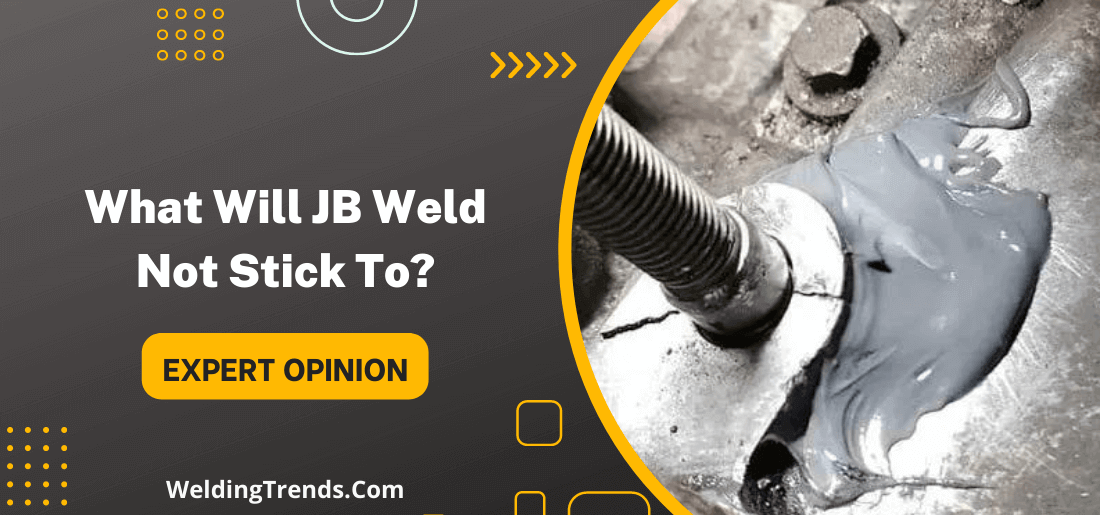JB weld is a popular brand of adhesive and sealant that is known for its strength and durability. But what will JB weld not stick to? In this blog post, we’ll take a look at some of the materials that JB weld cannot bond with.
Whether you’re using JB weld for repairs or crafts, it’s important to know which materials can and cannot be used.
So, what will JB weld not stick to? Keep reading to find out!
What is JB weld and what are its properties?
JB weld is an adhesive and sealant that is known for its strength and durability. The product was originally designed for use in the automotive industry, but it can be used for a variety of repair and craft projects. JB weld is made from two parts: an epoxy resin and a hardener.
When we talk about the properties of JB weld, it is important to understand that the product cures when it is exposed to air. Once it cures, JB weld becomes a strong and durable adhesive that can resist temperatures up to 550 degrees Fahrenheit.
In terms of bonding, JB weld creates a chemical bond with the materials it is used on. This means that the bond created by JB weld is stronger than the bond created by other adhesives such as superglue.
some things that JB weld will not stick to or bond with permanently?
There are certain materials that JB weld will not stick to or bond with permanently. These materials include:
- PVC (polyvinyl chloride)
- ABS (acrylonitrile butadiene styrene)
- Fluoropolymers (such as Teflon)
- Polypropylene
- Polyethylene
These materials are not compatible with JB weld because they are made from different types of plastic. When JB weld cures, it creates a chemical bond with the material it is used on.
However, these materials are not made from the same type of plastic, so the bond is not as strong.
In addition to these materials, JB weld will also not stick to or bond with:
- Glass
- Ceramics
- Stainless steel
- Aluminum
- Copper
These materials are not compatible with JB weld because they do not have a porous surface. For the JB weld to bond with a material, it needs to be able to penetrate the surface of the material.
Finally, JB weld will not stick to or bond with:
- Oil
- Grease
- Paint
- Rust
- Plastic wrap
These materials are not compatible with the JB weld because they prevent the JB weld from bonding with the surface underneath.
Can JB weld be used on a variety of surfaces including metal, plastic, wood and glass – and if not, why not?
JB weld can be used on a variety of surfaces but not all. It works best on metals and plastics, but can also be used on wood and glass.
The main reason it does not work well on glass is that it does not stick to it very well. The other reason is that the JB weld is not very strong when used on glass so it is not recommended.
How do you go about using JB weld for a particular project or application?
There’s no one-size-fits-all answer to this question, as the best way to use JB weld depends on the specific project or application you’re working on.
However, in general, you’ll want to start by preparing the surface that you’ll be bonding together. This may involve cleaning it, sanding it down or otherwise preparing it so that the JB weld will adhere properly.
Once the surface is prepared, you’ll mix the two parts of the JB weld (the resin and the hardener) according to the instructions on the package. Then, you’ll apply the JB weld to one or both of the surfaces you’re bonding together, making sure to spread it evenly.
Once the JB weld is in place, you’ll need to clamp or hold the two surfaces together until the JB weld sets (this usually takes about 15-24 hours).
After the JB weld has been set, you can then remove any clamps or other holding devices and your repair should be complete!
How can you use this information to your advantage in various situations or projects you might be working on around the house or garage workshop?
This information can be helpful in a number of situations and taken advantage of while working around the house or garage workshop. If you are looking to use JB weld for a particular project.
It is important to take into account the different surfaces that it works best with as well as how to properly mix and apply the product. This will help ensure that your repair is strong and durable.
In addition, this information can be helpful if you are troubleshooting a problem with the JB weld.
If you find that the JB weld is not sticking to a particular surface or is not as strong as you would like, it could be due to one of the materials listed above. In this case, you may need to try a different adhesive or repair method.
Are there any potential drawbacks to using JB weld in certain applications?
Yes, there are some potential drawbacks to using JB weld.
- One potential drawback of using JB weld is that it is not as strong as some other adhesives on the market.
- Additionally, JB weld is not compatible with all materials, so you’ll need to take care when selecting a bonding surface.
- Finally, JB weld takes longer to set than some other adhesives, so you’ll need to be patient when waiting for it to dry.
FAQs – What will JB weld not stick to?
Does J-B Weld stick to vinyl?
No, J-B Weld does not stick to vinyl. This is because J-B Weld is epoxy and vinyl is plastic. Epoxies are not compatible with plastics. If you need to repair something made of vinyl, you will need to find a different type of adhesive.
Look for a product that is specifically designed to work with vinyl. There are many options available, so you should be able to find something that will work for your specific repair project.
Is J-B Weld stronger than epoxy?
This is a difficult question to answer definitively because the strength of each material depends on how it is used. J-B Weld is typically used for repairs where epoxy would not provide sufficient strength, so in that sense, J-B Weld may be stronger.
However, epoxy is generally considered to be more versatile than J-B Weld because it can be used in a wider range of applications.
Final Thoughts
JB weld is a great adhesive for many materials, but there are some surfaces that it will not stick to. If you are planning on using JB weld to fix something, make sure you know what it will and will not stick to.
With the right preparation, a JB weld can be a powerful tool in your repair arsenal. JB weld is a handy adhesive to have around the house, but it’s not always the best choice for every job.
Be sure to test it out on a small, inconspicuous area before using it on a more visible surface. With its wide variety of applications, JB weld is likely to come in handy for some projects you’re working on.




